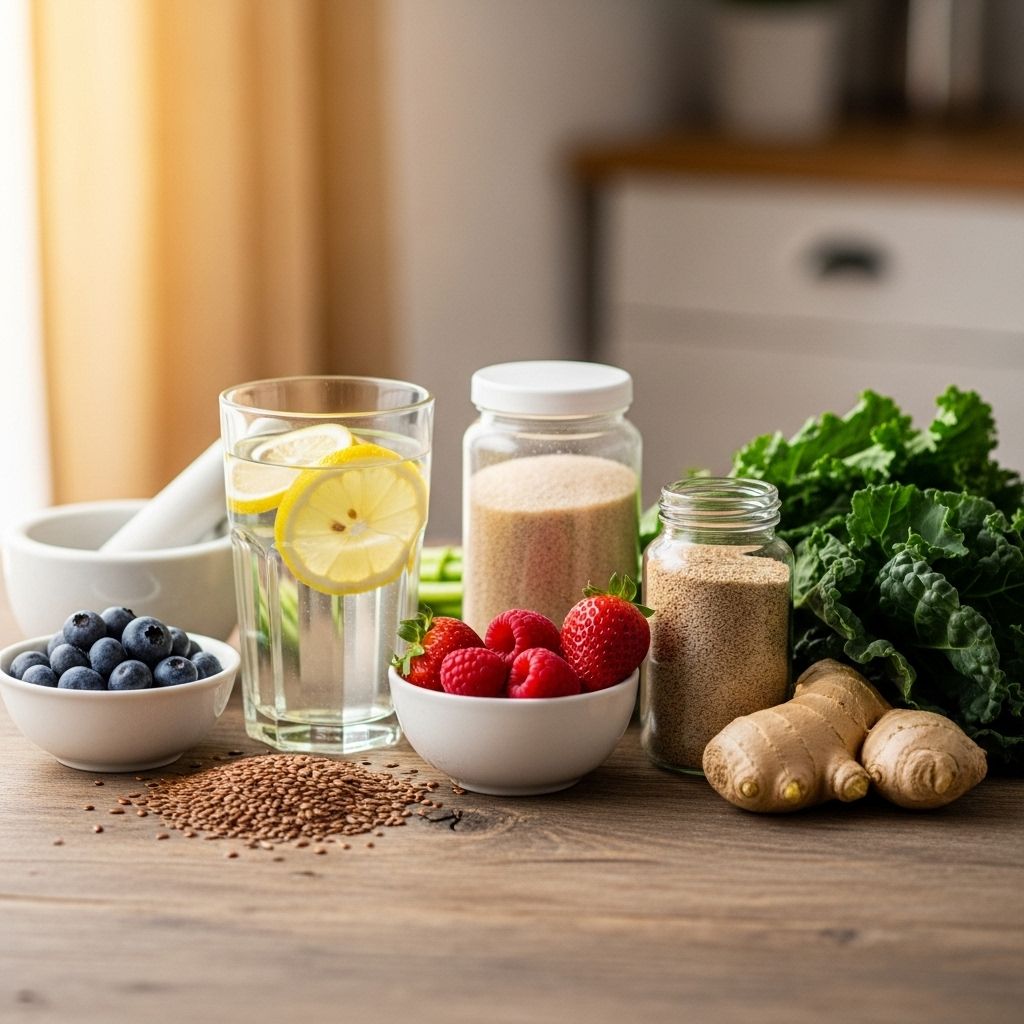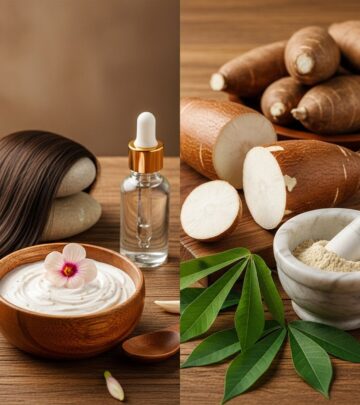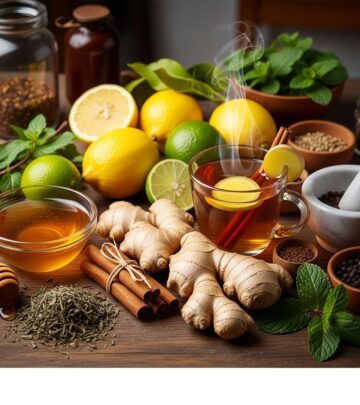Colon Cleanse at Home: Benefits, Methods, and Safety Tips
Discover natural colon cleansing methods, potential benefits, safety risks, and tips to cleanse your colon at home effectively and safely.

Colon cleansing is a practice aimed at removing waste and toxins from the large intestine using various methods, often promoted for enhancing overall health, digestive comfort, and energy levels. While a wide range of at-home techniques claim to cleanse your colon naturally, it is essential to understand the benefits, risks, and best practices before trying these methods. This comprehensive guide covers effective colon cleansing techniques, scientific evidence, potential side effects, safety precautions, and tips for maintaining a healthy colon.
Table of Contents
- What is Colon Cleansing?
- Natural Colon Cleansing Methods
- Claimed Benefits of Colon Cleanse
- Potential Risks and Side Effects
- Who Should Avoid Colon Cleansing?
- Expert Advice for Safer Colon Cleansing
- Tips for Naturally Maintaining Colon Health
- FAQs
What is Colon Cleansing?
Colon cleansing refers to a set of alternative health therapies designed to flush out material from the large intestine (colon). Proponents believe that cleansing removes toxins, relieves digestive issues, and boosts health. The most common at-home colon cleansing strategies include:
- Dietary adjustments, such as increasing fiber, water, or certain juices
- Herbal supplements with purported colon-cleansing properties
- Enemas or water irrigation (hydrotherapy)
While these methods are popular, it’s important to distinguish them from medically necessary colon preparation (pre-colonoscopy) performed under a doctor’s supervision, which uses evidence-based solutions and has proven effectiveness.
Natural Colon Cleansing Methods
Many individuals seek to cleanse their colon using natural approaches, believing them to be gentler and safer. Here are the most common methods:
1. Increase Water Intake
Proper hydration helps maintain healthy bowel movements and supports natural detoxification. Aim for at least 8-10 glasses of water daily to aid natural colon processes.
2. Eat More Fiber
Fiber promotes regularity and helps move waste through the digestive system. Sources include:
- Whole grains (brown rice, oats, quinoa)
- Fruits (apples, berries, pears)
- Vegetables (broccoli, carrots, leafy greens)
- Legumes (beans, lentils, chickpeas)
- Nuts and seeds (flaxseed, chia seeds, almonds)
3. Herbal Teas and Remedies
Some herbal teas are believed to have mild laxative effects, such as:
- Senna leaf tea
- Ginger tea
- Dandelion tea
- Aloe vera juice (use sparingly and with caution)
Note: The effectiveness and safety of many herbal remedies are not always backed by strong scientific research, and overuse can cause significant health issues.
4. Probiotics
Probiotics, or healthy gut bacteria found in fermented foods (yogurt, kefir, sauerkraut, kimchi) and supplements, help support normal digestion and may prevent harmful bacteria from proliferating.
5. Fruit and Vegetable Juices
Consuming certain juices, such as those containing apple, lemon, pineapple, or leafy greens, offers hydration, fiber, antioxidants, and vitamins that support bowel health.
6. Prunes and Other Natural Laxatives
Prunes, figs, chia seeds soaked in water, and psyllium husk are time-tested home remedies for constipation that promote regularity without harsh chemicals.
7. Saltwater Flush
This method involves drinking a mixture of warm water and salt (typically sea salt or pink Himalayan salt) on an empty stomach. Advocates claim it helps induce bowel movements, but it is not scientifically recommended and can cause dehydration and electrolyte imbalances.
8. Enemas (Use Extreme Caution)
Enemas introduce fluid into the rectum to stimulate the evacuation of the bowels. Common enema solutions include plain water, saline, or herbal infusions. Self-administered enemas carry significant health risks (see next sections) and should never be done without medical advice.
Claimed Benefits of Colon Cleanse
Advocates of colon cleansing believe it offers a variety of health improvements. Popularly claimed benefits include:
- Quick relief from constipation
- Boosted energy and sense of well-being
- Removal of toxins and harmful waste
- Improved digestion and gut function
- Better nutrient absorption
- Reduced risk of colon cancer
- Weight loss and reduced bloating
- Clearer skin and reduced headaches
- Enhanced immune response
However, medical experts emphasize that most of these benefits lack robust scientific backing. The body’s digestive system, particularly the liver and large intestine, is highly efficient at naturally detoxifying and eliminating waste without external cleansing methods.
Potential Risks and Side Effects
Despite their popularity, at-home colon cleanses and natural remedies are not without significant risks. Common side effects—and some serious complications—include:
- Cramping and abdominal pain
- Bloating and discomfort
- Diarrhea, which can lead to dehydration
- Nausea and vomiting
- Irritation or soreness around the anus
- Electrolyte imbalance—dangerous for people with kidney or heart issues
- Disruption of gut bacterial balance
- Infections, especially if using non-sterile equipment
- Potential for colon or rectal injuries (tears, perforations)
- Interference with medication absorption
- Rare complications such as liver toxicity or blood poisoning with certain herbal remedies
Some specialized colon cleansing techniques, like coffee enemas or those using herbal infusions, have been linked to severe health issues, hospitalizations, and even fatalities in rare cases.
| Risk | Description | Severity |
|---|---|---|
| Dehydration | Loss of fluids through diarrhea or induced bowel movements | Moderate to severe |
| Electrolyte imbalance | Disruption of sodium, potassium, and other minerals; dangerous for those with heart/kidney disease | Severe |
| Infection | Introduction of harmful bacteria through non-sterile tools | Potentially life-threatening |
| Colon/rectal trauma | Perforation or tearing of the colon lining | Severe, may require surgery |
| Medication interference | Reduces absorption or effectiveness of drugs | Varies |
Who Should Avoid Colon Cleansing?
Certain people are at much higher risk of complications from colon cleansing and should avoid these practices entirely unless instructed otherwise by their physician. These groups include individuals with:
- History of colon surgery
- Gastrointestinal diseases (colitis, Crohn’s, IBS)
- Kidney disease
- Heart disease or heart failure
- Diabetes
- Weakened immune systems
- Pregnant or breastfeeding women
Consult a healthcare professional before considering any colon cleansing, especially if you have underlying medical conditions, are taking medication, or are pregnant.
Expert Advice for Safer Colon Cleansing
If you are interested in colon cleansing, adhere to these essential safety measures:
- Consult your primary healthcare provider before starting any cleanse, especially if you take medications or have chronic illnesses.
- Never self-administer colonics or enemas with makeshift or non-sterile equipment.
- Research the credentials and reputation of any alternative medicine provider.
- Avoid overusing herbal laxatives or products without clear labeling of ingredients and dosages.
- Start with gentler dietary interventions, such as increased fiber and hydration, instead of aggressive cleansing or irrigation methods.
- Stay alert for symptoms like persistent nausea, severe pain, dizziness, or signs of infection after any cleanse, and seek medical attention promptly.
- Understand that there is no substitute for medically indicated colonoscopies or screenings.
Tips for Naturally Maintaining Colon Health
The best way to support a healthy colon is through daily habits, not periodic cleanses. Experts recommend the following lifestyle practices:
- Eat a balanced diet rich in fiber (fruits, vegetables, whole grains)
- Drink enough water for hydration
- Limit red meat, processed foods, and added sugars
- Reduce or avoid alcohol and tobacco
- Exercise regularly (aim for at least 150 minutes of moderate activity weekly)
- Maintain a healthy weight
- Schedule and attend routine colonoscopies as recommended by your healthcare provider
- Manage stress through yoga, meditation, or relaxation techniques
These practices not only contribute to colon health but can lower your risk of colorectal cancer, heart disease, and other chronic illnesses.
Frequently Asked Questions (FAQs)
Q1: Is colon cleansing necessary for good health?
No. Medical research indicates that the body is naturally adept at eliminating waste and toxins through regular digestion. Most people do not benefit from additional colon cleansing, and for some, it can be harmful.
Q2: Can colon cleanses help with weight loss?
No lasting weight loss is achieved through colon cleanses. Any minor weight reduction often results from water loss or temporary evacuation of waste, not fat loss.
Q3: Are herbal colon cleanses safe?
Herbal colon cleanses are not strictly regulated, and some ingredients can cause allergic reactions, dehydration, electrolyte disturbances, or even severe toxicity. Always consult a healthcare professional before using these products.
Q4: What are safer alternatives to colon cleansing for digestive discomfort?
Increasing dietary fiber, staying hydrated, exercising regularly, and consuming probiotics are proven, safer ways to support regular bowel function and digestive health.
Q5: Who should never attempt an at-home colon cleanse?
People with a history of colon surgery, heart or kidney disease, active gastrointestinal diseases, or those who are pregnant or immunocompromised should avoid colon cleansing unless prescribed and supervised by a medical doctor.
Q6: How can I recognize if a colon cleanse is causing harm?
If you experience severe or persistent stomach pain, vomiting, continuous diarrhea, dizziness, signs of dehydration, fever, or bleeding, seek medical attention immediately.
Conclusion
At-home colon cleansing is a controversial practice with a wide array of methods and purported benefits. Scientific evidence supporting its necessity or effectiveness is lacking, and the risks can be significant, especially if care is not taken. Instead, focus on long-term, healthy lifestyle habits and consult with your healthcare provider before considering any form of colon cleansing.
Read full bio of Sneha Tete











